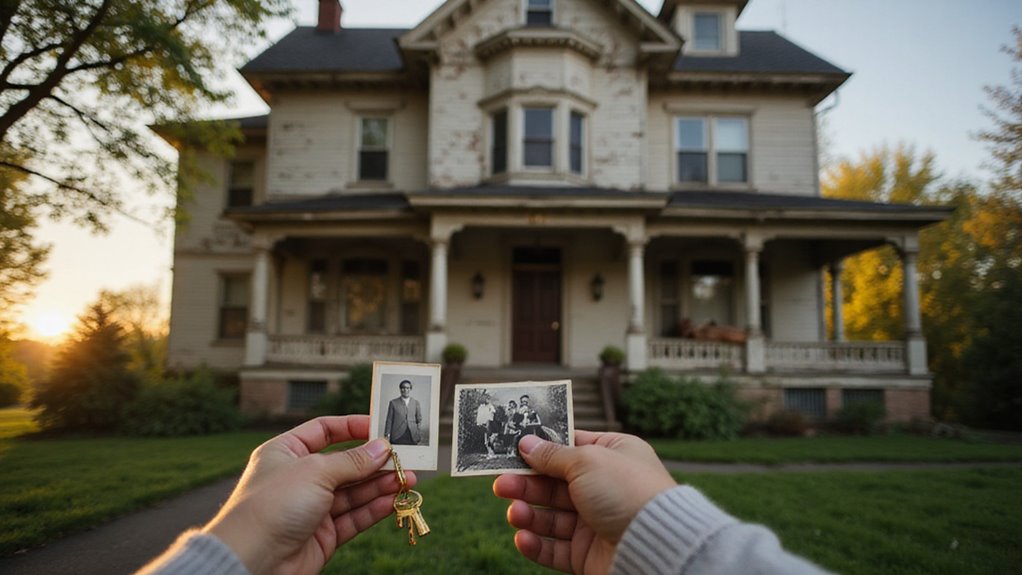Lost in a maze of paperwork and legal jargon after inheriting a house? The inheritance process brings unexpected challenges, from probate court complexities to confusing tax implications. Heirs often struggle with lengthy proceedings, unclear title requirements, and tough decisions about selling methods. Thankfully, understanding the key steps can transform this overwhelming process into a manageable journey.
Selling an inherited house requires navigating through probate court in Hamilton County, typically lasting 6-12 months. The property receives a stepped-up tax basis at current market value, reducing capital gains taxes significantly.
In this guide, we will explore every essential aspect of selling your inherited property successfully.
Key Takeaways
- Transfer ownership through probate court, which takes 6-12 months in Hamilton County, requiring death certificates and updated property deeds.
- Heirs receive stepped-up basis at fair market value, reducing capital gains taxes when selling the inherited property.
- Prepare the house by clearing belongings, completing necessary repairs, and making cosmetic improvements to attract buyers.
- Choose between traditional sales with agents for higher prices or cash buyers for quick 7-14 day closings without repairs.
- Pay outstanding debts, mortgages, and liens from sale proceeds before distributing remaining funds to heirs based on ownership percentages.
What Happens When You Inherit a House?
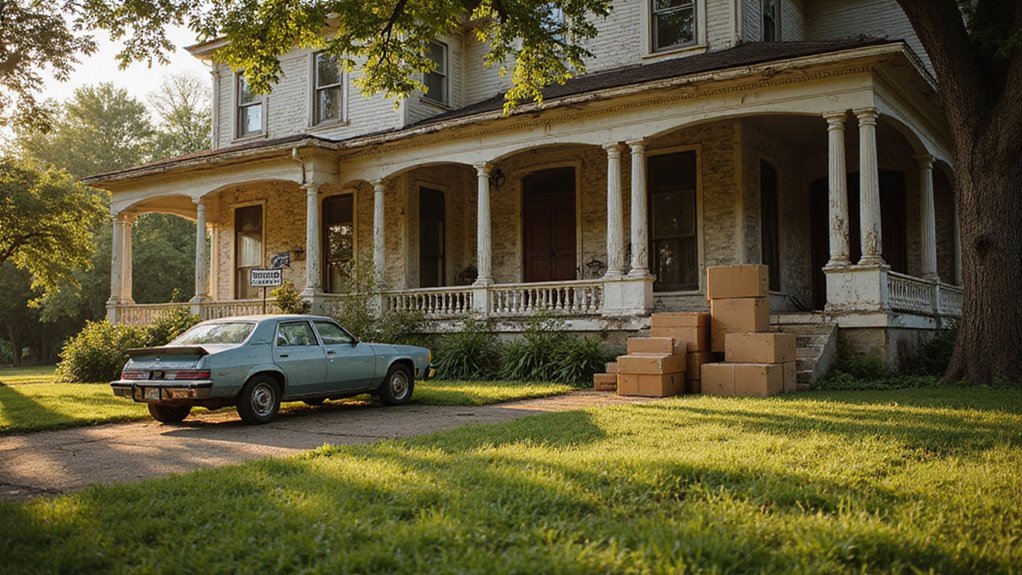
When you inherit a house, ownership doesn’t transfer automatically—you’ll need to navigate the probate process in Hamilton County to legally claim the property. You’re also responsible for understanding the tax implications, including capital gains calculations based on the home’s stepped-up basis at the time of death. Before making any decisions, you’ll need to assess the property’s condition, outstanding debts, and whether other heirs share ownership with you.
Legal Transfer of Ownership
A probate court order and new deed transfer ownership of inherited property in Ohio. The process requires specific documents and legal steps through Hamilton County courts.
Ohio Revised Code Chapters 2107 and 2113 set the requirements for property inheritance transfers. The legal transfer takes 6 to 12 months in standard cases. Complex estates may need up to two years for completion.
Additionally, owners must submit a certified death certificate and updated property deed. An estate attorney can guide heirs through document preparation and court requirements. This professional support helps prevent delays and ensures proper legal compliance.
Tax Implications of Inheritance
Inheritances come with specific tax obligations and potential benefits for beneficiaries. The IRS allows heirs to receive a stepped-up basis on inherited assets to the fair market value at death. This adjustment helps reduce future capital gains taxes. Most direct relatives in Ohio pay no inheritance tax due to state exemptions.
A smart tax strategy involves careful timing of asset sales. The tax benefits vary based on your relationship to the deceased and property type. Therefore, early consultation with a tax professional ensures maximum tax advantages.
Initial Assessment of the Property
A thorough initial property assessment prevents future complications and financial risks. A professional home inspection identifies structural issues, safety hazards, and needed repairs. Photos and detailed notes create documentation for insurance and legal purposes.
The property requires a “time of death” appraisal to establish fair market value and tax basis. To move forward, gather essential legal documents like the death certificate and will. Moreover, check for liens, mortgages, and unpaid taxes against the property.
The property must stay secure and maintained during this assessment period. Regular monitoring prevents vandalism and weather damage. As a result, proper documentation helps navigate probate court requirements smoothly.
What Are Your Options for an Inherited Property?
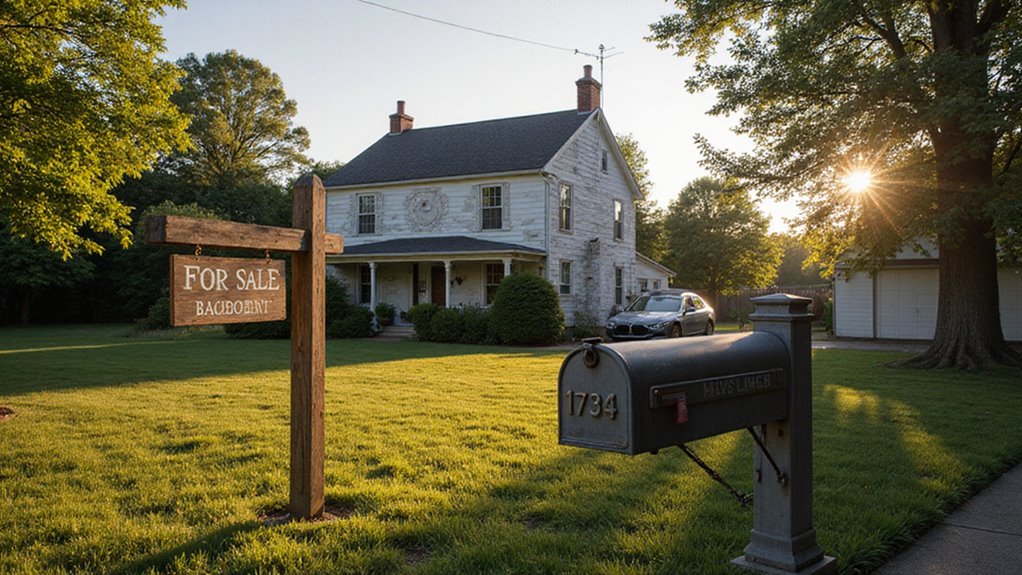
Once you’ve completed the probate process in Hamilton County, you’ll need to decide what to do with your inherited property. You can keep it as your residence, rent it out for income, sell it through a traditional real estate agent, or work with cash home buyers for a faster transaction. Each option has distinct financial and legal implications that’ll affect your timeline and net proceeds.
Keeping the Property
You can keep an inherited Cincinnati house if you can handle its financial obligations. The main costs include mortgage payments, property taxes, insurance, and regular maintenance. A clear property title must be obtained through probate before making this decision.
Legal steps matter for smooth ownership transition. Written agreements become essential when multiple heirs share the property. Your insurance policies need updates to reflect the new ownership status.
The house can serve as your primary residence or an investment property. Rental income helps offset expenses but requires proper landlord management. Local rental laws and regulations must be followed for tenant agreements.
Renting Out the Inherited House
Renting an inherited house requires careful planning and legal steps before listing it. Legal ownership must be established through probate court approval. Written permission from all heirs is mandatory before renting the property.
A thorough property inspection helps identify essential repairs and maintenance needs. The rental income must be reported on tax returns, including deductions for repairs and property expenses. Additionally, maintaining proper documentation ensures compliance with local rental laws.
Make sure to draft a clear exit strategy for future property sale. You can list the property quickly when market conditions are favorable. In the meantime, rental income offsets ownership costs.
Selling to Traditional Buyers
Traditional home buyers expect a polished, market-ready property and a conventional sales process. Your property must meet standard market conditions through repairs and updates before listing. Professional photos and strategic marketing will attract qualified buyers to your home. Regular cleaning and maintenance keep the property appealing during the showing period.
A traditional sale involves multiple steps and longer timelines than other options. Most buyers request inspections and often negotiate repairs or price reductions. The entire process typically takes 60-90 days from listing to closing.
For the best outcome, prepare your property to compete with similar homes in your market. This approach attracts serious buyers who can secure traditional financing.
Working with Cash Home Buyers
Cash home buyers provide a fast, simple solution for selling inherited properties. These investors typically close deals within 7-14 days and pay in cash. You’ll receive less than market value but avoid agent fees and repair costs.
The process works well for out-of-state heirs or properties needing major repairs. Cash buyers handle paperwork directly with estate attorneys. Your inherited house sells in its current condition.
Moreover, this option benefits situations with multiple heirs or tight probate deadlines. Cash buyers resolve common issues like liens, title problems, or back taxes during the transaction. Quick distribution of proceeds helps settle estates efficiently.
How to Prepare an Inherited House for Sale?
Once you’ve decided to sell your inherited Cincinnati home, you’ll need to prepare it for market while satisfying legal requirements. This means clearing out personal belongings, making necessary repairs, resolving any outstanding liens or mortgages, and gathering essential documents like your probate order and updated deed. Proper preparation ensures a smoother sale process and helps you avoid delays at closing.
Clearing Out Personal Belongings
How to Clear Out Personal Belongings from a House A systematic cleanout helps reduce stress when dealing with personal belongings. Start by gathering family members to identify important keepsakes and heirlooms. Each heir must agree on how to distribute valuable or sentimental items.
The next phase focuses on remaining items. Professional estate sale companies can manage pricing and selling unwanted possessions efficiently. Local charities welcome donations of usable furniture, clothing, and household goods. As a result, the house becomes ready for potential buyers to view.
Handling Necessary Repairs
Make repairs in order of importance and keep detailed records of all work. Essential repairs require immediate attention. Start with safety issues like faulty electrical systems, broken plumbing, and structural damage. Take photos and keep all receipts for documentation. Your records will help justify the final sale price.
Basic improvements boost property value effectively. A fresh coat of paint, new flooring, and enhanced curb appeal attract potential buyers. Cash buyers will purchase properties as-is, but expect offers 15-20% below market value.
Consider your available time and resources carefully. The scope of repairs affects your budget and selling timeline.
Addressing Outstanding Liens or Mortgages
Outstanding liens and mortgages require prompt resolution before selling or transferring inherited property.
A thorough title search will reveal all existing debts against the property. The estate must settle these debts from available funds or sale proceeds. Lenders can provide current payoff amounts for accurate debt calculations.
Contact each lienholder to request written releases. Most lienholders must respond within 30 days of receiving payment. Furthermore, proper documentation protects new owners from future claims.
A real estate attorney can guide this process and ensure legal compliance. Once cleared, the property becomes marketable with clean title status.
Obtaining Essential Documents
Three essential documents are needed to sell an inherited house in Ohio. A death certificate from the Ohio Department of Health proves the original owner’s passing. This official record enables the start of property transfer procedures. The document costs vary by county.
Letters Testamentary from Hamilton County Probate Court establish executor authority. These legal papers allow access to the deceased’s accounts and property management. Furthermore, they protect buyers’ interests.
A Probate Court judgment authorizes the final property title transfer. This document completes the legal requirements for the sale. After this, the executor can proceed with listing the property.
What Legal Considerations Should You Know?
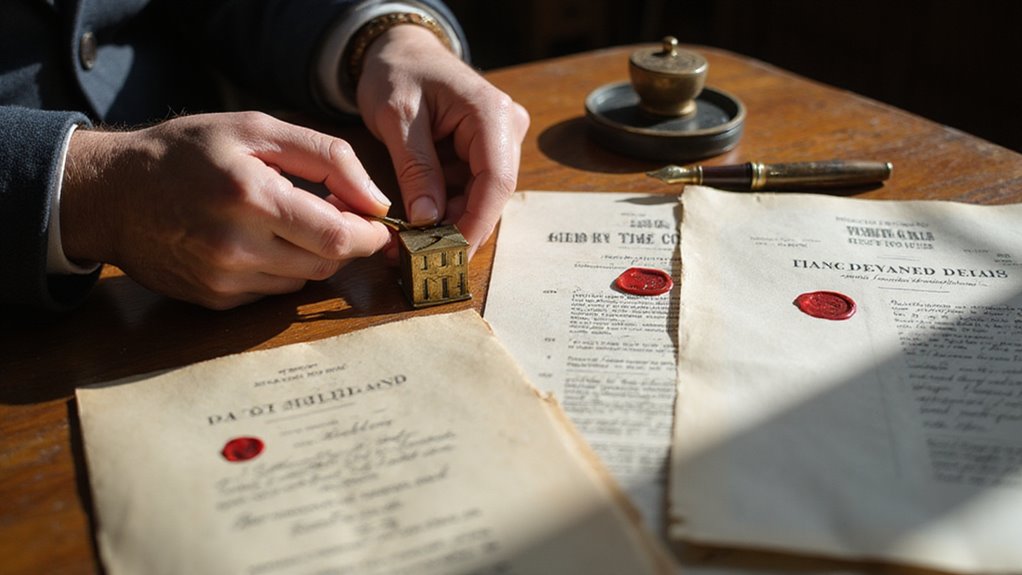
Before you list your inherited Cincinnati home, you’ll need to navigate three critical legal requirements that directly affect your timeline and net proceeds. First, you must complete the probate process through Hamilton County Probate Court to establish legal authority to sell. Additionally, you’ll need to understand your estate tax obligations and calculate potential capital gains taxes using the property’s enhanced basis from the time-of-death appraisal.
Probate Process Explained
Probate transfers property ownership after someone dies through a legal court process. The process requires several key documents and steps for proper execution.
Executors must file the deceased’s will at Hamilton County Probate Court within 30 days. Letters testamentary and death certificates prove legal authority to handle the estate. A clear property title requires payment of all outstanding debts and liens.
Property heirs need to agree on distribution or face potential court intervention. The full probate timeline ranges from 6 to 12 months in Cincinnati. Professional guidance helps navigate Ohio’s legal requirements smoothly.
Estate Tax Obligations
Estate tax obligations remain minimal for most inherited Cincinnati properties. Federal estate taxes only affect properties worth over $13.61 million in 2024. Ohio has no state estate tax since 2013.
A property appraisal determines your future tax responsibilities. The “stepped-up basis” value comes from the property’s worth at the time of death. This basis helps calculate potential capital gains taxes upon sale.
As a practical step, professional tax guidance can clarify your specific obligations. Capital gains taxes apply only when you sell above the stepped-up basis value. Most heirs face limited tax concerns with their inherited properties.
Capital Gains Tax on Inherited Property
Capital gains tax applies to profits made when selling inherited property above its stepped-up basis value. The tax basis resets to the property’s fair market value on the date of inheritance. You must pay capital gains tax only on the difference between the sales price and this stepped-up basis value. A professional appraisal establishes the correct basis amount.
Moreover, beneficiaries can claim a $250,000 capital gains exclusion if they live in the inherited home for at least two years before selling. To ensure compliance, proper documentation and IRS Schedule D reporting remain essential.
How to Determine the Right Selling Price?

Determine a property’s selling price through careful market research and professional guidance. A Comparative Market Analysis (CMA) examines recent sales of similar properties to suggest a competitive price point. A professional appraisal provides an official valuation based on property condition and local market factors.
Pre-listing inspections reveal needed repairs that could impact your final asking price. Local real estate agents understand current market trends and buyer expectations. Your agent can assess unique property features against neighborhood comparable sales.
Properties inherited through estates require special consideration due to tax implications and stepped-up basis calculations. In such cases, a professional appraisal establishes the correct tax basis value. Moreover, experienced probate agents offer specialized knowledge for estate property transactions.
What Are the Financial Implications of Selling?
When you sell an inherited house in Cincinnati, you’ll face three major financial considerations that directly impact your proceeds. First, you need to understand the tax consequences, including capital gains based on the stepped-up basis and any applicable estate taxes. Second, you must navigate how proceeds will be distributed among multiple heirs and ensure all existing debts, liens, and mortgages on the property are settled before closing.
Tax Consequences
Several taxes apply when you inherit and sell a house in Cincinnati. The IRS uses a stepped-up basis rule to calculate capital gains tax from the property’s value at death. Your tax burden depends on the sale price minus this stepped-up basis.
Federal estate taxes only affect inheritances worth more than $13.61 million in 2024. Ohio no longer charges estate tax on deaths after 2013. Furthermore, any rental income from the inherited property must be reported on your tax return. A qualified tax professional can guide you through these obligations and help maximize tax benefits.
Distribution of Proceeds Among Heirs
Distribution of inherited property proceeds follows a legally mandated order in Ohio. Outstanding debts, mortgages, and liens must be paid first from the sale proceeds. Estate administrative costs and executor fees take second priority in the payment sequence. Heirs receive their shares last, after all obligations are settled.
| Distribution Priority | Payment Order |
| Debts & liens | First |
| Administrative costs | Second |
| Heir distribution | Final |
For shared inheritances, co-owners split the remaining proceeds based on their ownership percentages defined in the will or state intestacy laws. A probate attorney oversees this process to ensure correct distribution. The final amount each heir receives depends on the property’s sale price and total obligations paid.
Handling Existing Debts on the Property
All existing debts must be settled before selling an inherited property. The first step requires obtaining official payoff statements for any mortgages or liens on the house. A title search through county records helps identify hidden debts or claims. Smart sellers negotiate with creditors for potential debt reductions or settlements.
Final sale proceeds must cover all outstanding obligations. Typical debts include mortgages, tax liens, HOA fees, and home equity loans. Quick action on debt resolution protects the inheritance value for beneficiaries.
In addition, proper debt handling prevents costly delays during closing. Contact a real estate attorney for guidance on complex debt situations.
How to Sell Your Inherited House Fast?
You have several options to sell your inherited Cincinnati home quickly, each with distinct timelines and trade-offs. Working with real estate agents or listing on the open market typically yields higher sale prices but takes longer to close. Alternatively, selling directly to cash buyers or negotiating with investors can expedite the process significantly, often closing within weeks rather than months.
Working with Real Estate Agents
A real estate agent guides sellers through listing, marketing, and closing their properties. Professional agents handle paperwork, negotiations, and property showings on your behalf.
Look for agents with strong local market knowledge and proven sales records. Licensed agents must follow state regulations and code of ethics in all transactions. The best agents maintain networks of qualified buyers and industry professionals.
A good agent will provide regular updates and clear communication throughout the selling process. Standard agent commissions range from 5-6% of the final sale price. Consider interviewing multiple agents before making your choice.
Listing on the Open Market
The open market offers the best opportunity to sell inherited property at maximum value. A typical open market sale takes 30-90 days, plus additional time for probate court approval. Professional real estate agents handle pricing, marketing, and buyer negotiations effectively.
Market-based pricing attracts serious buyers quickly. Home staging makes properties more appealing to potential buyers. Your agent coordinates all showings and manages paperwork requirements.
This traditional sales method serves both sellers and buyers well. Local market comparisons help set competitive prices that reflect current property values. The process ensures fair transactions with qualified buyers.
Selling Directly to Cash Buyers
Cash buyers purchase properties directly without real estate agents or banks involved. This approach eliminates the need for traditional financing and lengthy approval processes. Direct buyers can close deals quickly with available funds.
Cash offers arrive within 48 hours after property evaluation. The sale typically closes in 7-14 days. No repairs, staging, or property updates are required.
Moreover, sellers avoid realtor fees and marketing costs. The straightforward process includes a property assessment, offer review, and simple closing. As a result, homeowners can sell their properties without stress or uncertainty.
Negotiating with Investors
How to Negotiate Successfully with Real Estate Investors Direct offers from multiple investors help establish fair market value for inherited properties. A professional appraisal strengthens your position at the negotiating table. Most investors expect a 10-30% discount on inherited properties due to repair needs and closing complexities.
Clear documentation speeds up the process and builds investor confidence. Present your probate papers, death certificate, and property title upfront. The estate attorney can verify your legal authority to sell.
Furthermore, open communication about property issues prevents delays. Share information about existing liens, needed repairs, and agreements between heirs. Smart sellers typically close within 30-45 days when negotiations focus on transparency and mutual benefit.
Ready to Sell Your Inherited House? Contact Prestige Investments Cincinnati Today!
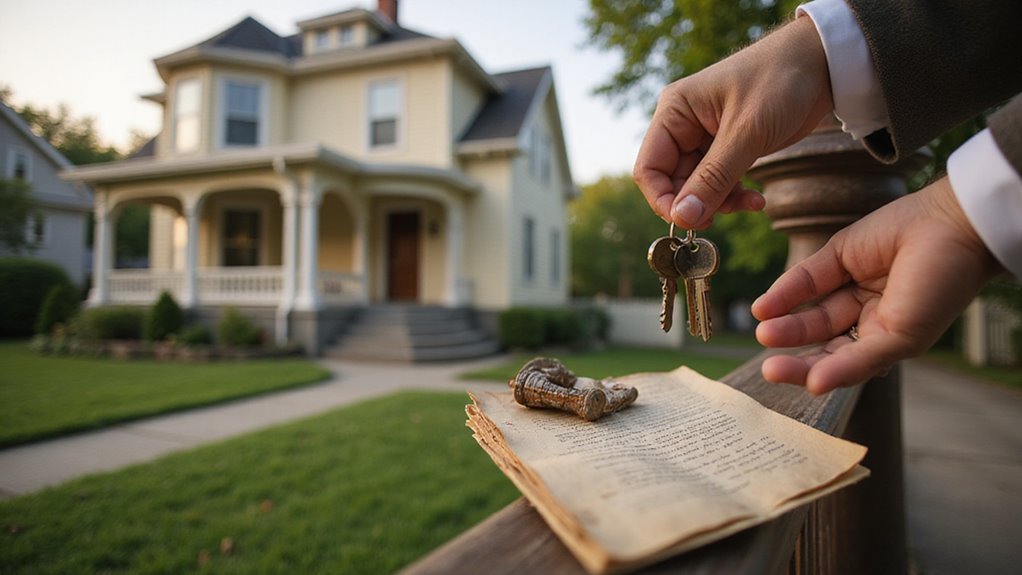
Prestige Investments Cincinnati buys inherited houses for cash. Our team understands probate laws and streamlines the entire selling process.
A fair cash offer arrives within 24 hours after our property assessment. Our probate experts coordinate directly with attorneys to handle paperwork. All heirs receive updates at each step of the transaction.
The sale closes on your schedule, typically within 7-14 days once probate clears. No repairs or renovations are needed before selling. You can move forward while we manage the property details. Most importantly, your family’s interests remain protected throughout the process.




